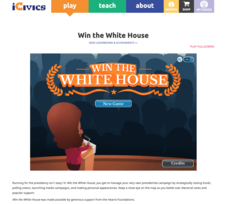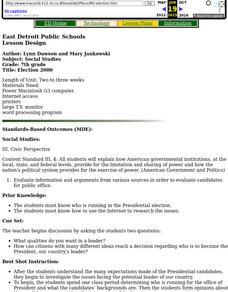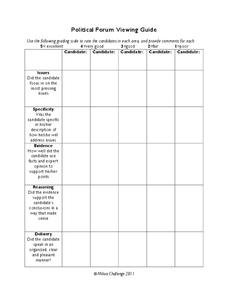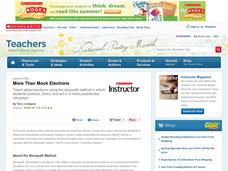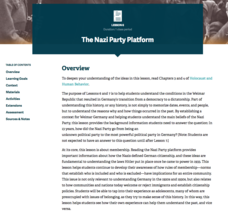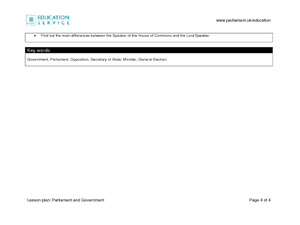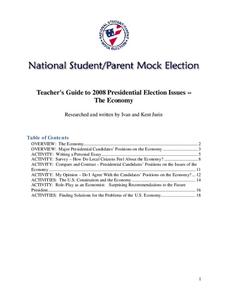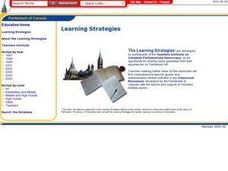iCivics
Win the White House
What does it take to win the White House? A video game allows young political operatives to try their hand at winning 1600 Pennsylvania Avenue by deciding on key issues, where and how to spend campaign dollars, and the role of polling...
Curated OER
Election 2000
Seventh graders explore issues facing the potential leader of our country, form opinions about the candidates representing the two major political parties, research election material and choose candidates, conduct debates, and vote in...
Mikva Challenge
Political Forum Viewing Guide
Is there a way to determine a winner of a political debate? Use a helpful rubric to evaluate the issues, specificity, evidence, reasoning, and delivery of candidates in a debate. After assessing each person's performance, high schoolers...
Curated OER
Registering to Vote
Eighth graders register to vote. In this registration lesson, 8th graders complete the first step of the voting process by completing a form. Students use this lesson to prepare for a mock election. The lesson is part of a unit.
Curated OER
Citizens of the Future
Young sociologists explore how local, state, and federal governments work. This very impressive and ambitious lesson requires pupils to contact government officials who represent them and their families. They research elections, and hold...
Curated OER
More Than Mock Elections
Students create a presidential campaign story. In this presidential campaign lesson, students produce, direct and act in their own campaign story. Stories focus on setting, characters, context, critical incidents, and concluding events.
Curated OER
Election 2005: Campaign Issues
Learners take a closer look at the election of 2005. In this British politics instructional activity, students listen to a lecture about the 2005 campaign and active citizenship. Learners then create collages and news boards about the...
Facing History and Ourselves
The Nazi Party Platform
Not all party platforms stay democratic. A resource covers many political issues in Germany during the time of World War II, and teaches pupils about the Nazi party platform and what went wrong. Individuals participate in a warm-up...
Constitutional Rights Foundation
Suppressing the Vote
Voting rights have expanded over time, but some voters are still being suppressed. A thought-provoking resource explores the history of voter suppression in the US and efforts to remove roadblocks to voting. Young historians learn about...
Curated OER
YOUR OWN CAMPAIGN
Twelfth graders, in groups propose a new law and design a campaign to get people to vote for their law. They have a voter's forum and hold a mock election.
Curated OER
Election of 1860
Young scholars determine how the presidential election of 1860 led to the American Civil War. In this election of 1860 lesson, students discover details regarding the election and hold their own mock debate and election. Young scholars...
Curated OER
Parliament and Government
Students examine the roles of those in Parliament. In this British government lesson, students participate in a mock election and conduct research regarding the difference between Parliament and government.
Curated OER
Time for Change? A look at Canada's electoral system.
Tenth graders cultivate respect and appreciation for Canadian Parliamentary democracy. They build curiosity and interest in studying citizenship issues related to Parliament and by engaging in a mock election.
Curated OER
Teacher's Guide to 2008 Presidential Election Issues: The Economy
Students discuss the 2008 Presidential election. They examine the significant issues of the election and focus on the economy. Students study the major issues with the economy. Students decide how they feel about each canidates' views...
Curated OER
Results In On Mock Election
Students examine the two presidential candidates in 2000, and identify their own stance on campaign issues. They create fictional candidates that represent their beliefs, and write campaign speeches from their point of view.
Curated OER
The President's Cabinet: Choosing the Right Person for the Job
Students examine the Federal Confirmation Process for filling cabinet members by completing a confirmation process flow chart. They research the process, and participate in a mock Confirmation Process.
Curated OER
Donkeys and Elephants and Voters, Oh My!
Students celebrate party politics. In this American politics lesson, students discover what the 2 main political parties in the country are and discuss their functions. Students then participate in a classroom simulation that requires...
Curated OER
A Tale of Two Wars
Young scholars create Venn diagrams comparing and contrasting the Vietnam and Iraq wars. They write informed letters to their senators expressing their opinions and possible solutions to the war. They also create mock bumper stickers...
Curated OER
The Great Debate
Students watch tapes of televised presidential debates dating from 1960. They analyze debates and participate in mock debates.
Curated OER
Exercising the Franchise! The Right to Vote
Pupils research Canadian election procedures, identify candidates and corresponding political platforms for current elections and hold mock elections. They develop a written report about a specific political party.
Curated OER
Ballots
In this history worksheet, students utilize individual ballots to vote in a mock election/classroom election throughout the year as needed.
Curated OER
Voting Ballot
In this voting process worksheet, students use the ballots to vote in a mock election or classroom election. Students may write the candidate names or initiatives in the blanks.
Curated OER
The Voting Game
Young scholars examine and discuss the Canadian electoral process. They conduct a simulation of the electoral process, with students running as candidates, holding a convention, campaigning, and voting for Prime Minister of the Day.
Curated OER
So You Want to Be President?
Students examine the qualities needed to become President. In this political science lesson, students read the book So You Want to Be President? and answer questions based on the text. Students discuss if they have the qualities...


